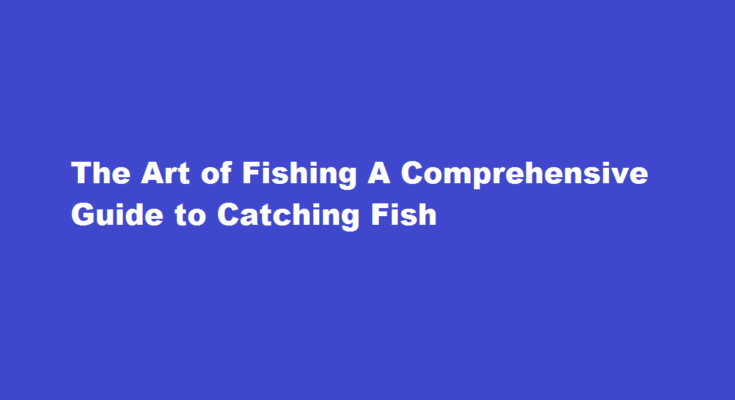Introduction
Fishing is not just a leisure activity but also a skillful pursuit that requires knowledge and patience. Whether you’re a novice or an experienced angler, this guide will provide you with valuable insights and techniques to enhance your fishing skills and improve your chances of catching fish.
Understanding Fish Behavior
To become a successful angler, it is crucial to comprehend fish behavior. Different species have unique preferences and habitats. Research and understand the fish you intend to catch—study their feeding patterns, preferred depths, and the type of bait they respond to. Additionally, observe the water conditions, such as temperature, clarity, and currents, as these factors influence fish activity.
Selecting the Right Equipment
Choosing the appropriate fishing equipment is vital. Select a fishing rod and reel that match the type of fishing you plan to do—whether it’s freshwater, saltwater, or fly fishing. Consider the fishing line strength and material, hooks, sinkers, and floats. Additionally, invest in quality bait and lures specific to the species you want to catch. Consult local tackle shops or experienced anglers for recommendations on the best gear for your fishing goals.
Mastering Casting Techniques
Learning proper casting techniques is crucial to ensure accurate and effective bait or lure placement. Practice your casting skills in open areas, aiming for accuracy and distance. Master different casting styles such as overhead, sidearm, and roll casting, depending on the fishing environment. Develop a smooth and controlled casting motion to minimize disturbances that may scare away fish.
Utilizing Bait and Lures
The choice of bait and lures significantly impacts your fishing success. Natural bait, such as worms or minnows, works well for many species. Lures, on the other hand, mimic the appearance and movement of prey to attract fish. Experiment with various bait and lure types, sizes, and colors to determine what works best for your target species and fishing conditions.
Practicing Patience and Persistence
Patience is a virtue in fishing. It may take time to find the right spot and for fish to respond to your bait. Remain calm, maintain focus, and be prepared to wait. Observe the water for signs of fish activity, such as splashes, ripples, or feeding birds. If you’re not getting any bites, consider changing your bait, location, or fishing technique. Persistence and adaptability are key to increasing your chances of success.
Adhering to Local Fishing Regulations
Responsible fishing involves following local fishing regulations and guidelines. These regulations are designed to protect fish populations, ecosystems, and ensure sustainable fishing practices. Familiarize yourself with size limits, catch-and-release policies, and fishing seasons specific to your area. Respect the environment and fellow anglers to preserve the beauty of fishing for future generations.
FREQUENTLY ASKED QUESTIONS
What are 3 things you need to catch a fish?
With a line, hooks, and bait, you have everything you NEED to catch fish.
How is fish caught?
Gillnets are used to catch cod, perch, salmon, sardines, trout, and many other species. Hand Lines are used to catch high-value tuna and other species. This gear consists of a fishing line with a baited hook. When in use, fishermen haul in the line hand-over-hand.
Conclusion
Catching fish requires a combination of knowledge, skill, and perseverance. By understanding fish behavior, using the right equipment, mastering casting techniques, and selecting the appropriate bait and lures, you can greatly enhance your fishing success. Remember to be patient, observe your surroundings, and adapt your approach as needed. Fishing is not just about the catch; it’s about immersing yourself in nature and enjoying the experience. So, grab your gear, head to your favorite fishing spot, and embrace the art of fishing with passion and respect.
Read Also : Mastering Data Organization A Guide to Categorizing Data in Excel



